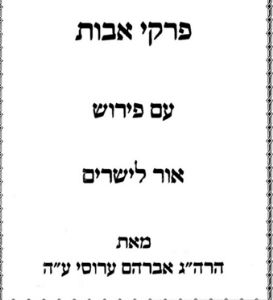A Short Tribute
Hacham Mori Avraham Arussi, son of Hacham Moshe, was born in 1878 in Yemen. He began learning Torah with Hacham Mori Yihya Hamdi. He became a shochet and bodeq and taught children in his town. He was also appointed by the Tsana'a Rabbinic Court to supervise shochatim and to train Torah scholars as shochatim and as Halakhic adjudicators. His work as a supervisor of religious affairs entailed frequent travel throughout Yemen and, standing fast, he would reprimand any injustice he encountered. He recorded his travels and collected the stories he heard from Yemen's sages in his book, Koreh HaDorot.
In 1922, Hacham Mori Avraham Arussi moved to the Land of Israel, settling in Tel Aviv. Noting that the Torah and its commandments were not being observed, he set out traveling throughout the country to encourage people to observe the commandments.
Hacham Mori Avraham Arussi passed away on 17 Adar, 5695 (1934) and was buried in Petach Tikva.
Hacham Mori Avraham Arussi wrote many original Torah commentaries, much of which remains in manuscript form. His published books include Koreh HaDorot, Yoreh Hata'im, Ohel Mo'ed and Or LaYesharim – a commentary on Ethics of Our Fathers.
